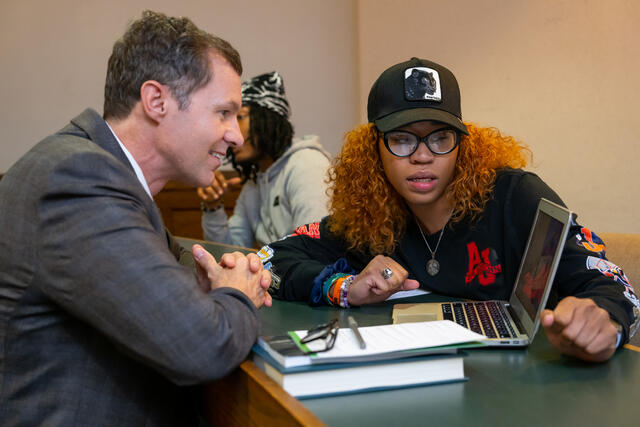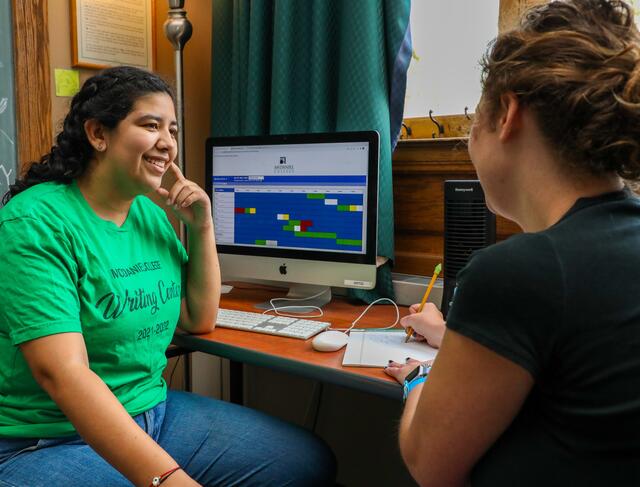McDaniel student leaders trained in Mental Health First Aid
This fall, McDaniel student leaders trained in Mental Health First Aid with college staff who are certified instructors, laying a foundation for wider access to mental health support strategies in the campus community.

2023 peer mentors, wearing green, cheer on the incoming first-year students after they "ring in" with Old Main bell, a tradition during new students' first week. Peer mentors provide dedicated support to a cohort of students for their entire first year.
McDaniel’s strategic plan, “Reaching New Heights,” has a core focus on the dimensions of wellness: social, spiritual, financial, environmental, emotional, intellectual, and physical. One of the ways campus leaders are upholding those values this fall is with new and ongoing Mental Health First Aid (MHFA) training on the Hill, with long-standing support from the Carroll County Health Department (CCHD).
For the first time, two campus leaders, Associate Director of First-Year Experience and Transition Programs Lisa Lebo and Wellness Center Counselor Natalie Williams, are certified to provide the adult, higher education module of MHFA training to community members on McDaniel’s campus.
Preparing student leaders to support peers
The first training cohorts this semester for Lebo and Williams comprised student leaders who work closely with their fellow students, including student engagement peers, resident assistants, peer mentors, and Edge Experience mentors.
“They’re all doing different things on campus, and now there’s more people out there to provide support,” says Williams, who was a mental health first-aider long before she became a licensed clinical professional counselor.
MHFA, managed by the National Council for Mental Wellbeing and Missouri Department of Health, “is a skills-based training course that teaches participants about mental health and substance-use issues.”
"The students find it very helpful that they can now identify scenarios and have the tools to address them.”
The goal of the training is to make MHFA as common as CPR, with a similar aim. According to the council, “In both situations, the goal is to help support an individual until appropriate professional help arrives.”
Trainees learn about risk factors and warning signs for mental health or substance use problems, engage in experiential activities that improve understandings of the impact of illness on individuals and families, and learn about evidence-supported treatment and self-help strategies.
When equipped with the appropriate steps to support fellow students, student leaders on the Hill can address concerns confidently and competently, Lebo says.
“The student leaders are strictly there to provide support and referral. In the training, we go over at what points you get what kinds of support,” Williams says. “The students find it very helpful that they can now identify scenarios and have the tools to address them.”
A milestone, but not the first one for MHFA on the Hill
While this is the first time McDaniel staff have doubled as certified instructors, it isn’t the first time students have been trained in MHFA on the Hill.

Social Work majors presented on their field placement experiences at the 2023 Academic Symposium.
Around 2016, Social Work professors Cathy Orzolek-Kronner ’86 and Jim Kunz participated in a MHFA training hosted by the CCHD for interested members of the McDaniel community.
“We realized how practical this training would be for Social Work students in their field practicums,” Orzolek-Kronner says. “We are very fortunate to have a robust partnership with CCHD,” Orzolek-Kronner says.
Kunz and Orzolek-Kronner soon began ensuring that all Social Work students enrolled in the Social Work Practice course — in which they engage in hands-on service learning at community organizations — complete eight hours of MHFA training and also learn to administer Narcan to treat narcotic overdoses.
“I believe that the MHFA training provides a good foundation for understanding some of the mental health issues that people experience, as well as their subtle nature, and guidance on how to intervene."
Social Work juniors complete their service learning at places like the Cold Weather Shelter, the CCHD, and On Our Own, a drop-in day program for low-income and homeless individuals interested in recovery from substance misuse and/or behavioral health issues. Orzolek-Kronner notes that these agencies serve people who are at high risk of having a mental health crisis at any time.
“I believe that the MHFA training provides a good foundation for understanding some of the mental health issues that people experience, as well as their subtle nature, and guidance on how to intervene, although I would also advocate for ongoing conversations in this regard,” Orzolek-Kronner says.
Joining a national movement to provide students with lifelong skills
The National Council for Mental Wellbeing has a goal to train one out of every 15 people in America in MHFA, and “McDaniel is a part of the national movement,” says Lecturer and Writing Center Director Vanessa Flora-Nakoski.
In Maryland, there are around 73,000 total first aiders, and only 1,258 are trained in the higher education module like McDaniel community members.
Another earlier implementation of MHFA at McDaniel was in the fall of 2021, when Flora-Nakoski decided to train Writing Center tutors in MHFA, after she heard that Social Work majors received the training on a regular basis.

Equipping writing tutors with this training is important because “writing can be anxiety inducing for students, and many are writing about topics that are emotionally heightening or personal, since a lot of people process traumatic events with writing,” Flora-Nakoski says.
She connected with the CCHD, which offers free MHFA training to Carroll County residents and held a special on-campus training at cost for McDaniel Writing Center tutors. Flora-Nakoski credits Katie Mack, a program director with CCHD, for her significant support in getting training for the tutors.
“Mental Health First Aid is about having really good conversations, a heightened awareness of what you might be observing in a person, listening skills when a person does disclose something to you, and information to offer when someone does need or want it,” says Flora-Nakoski, who is a certified instructor in youth MHFA, which differs in curriculum from the adult training.
MHFA training should be renewed every three years, but once students are trained to provide MHFA at McDaniel College, they will always carry the knowledge and strategies with them into future careers.
“The tutors tell me they’re using it, they’re listening and responding differently, and know what resources they can direct peers to if they need support."
“The tutors tell me they’re using it, they’re listening and responding differently, and know what resources they can direct peers to if they need support,” Flora-Nakoski says. “While seeking new tutors for this year, my current tutors always brought up that one of the reasons they valued this job was because of the Mental Health First Aid training.”
With staff members on campus who are now certified instructors of MHFA, more students than ever will have the opportunity to join the movement and help their peers and communities.